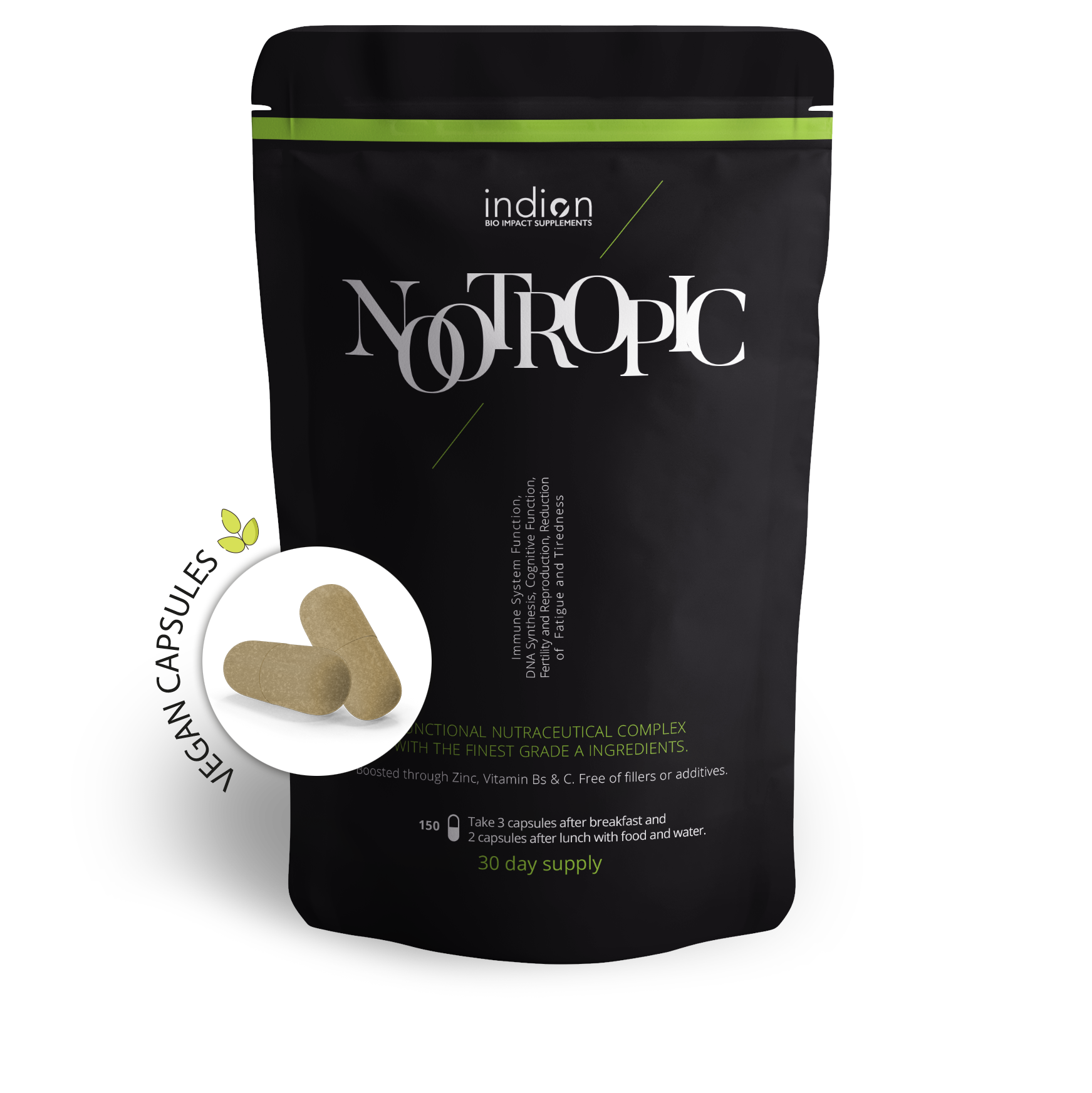Supplementing with phosphatidylserine has been shown to have cognitive-enhancing effects, making it popular among athletes, fitness enthusiasts, and CrossFit athletes.
But what is phosphatidylserine, and how does it work?
In this blog post, we’ll take a look at the science behind this nootropic ingredient to see if it lives up to the hype.
What is phosphatidylserine and what are its benefits?
Phosphatidylserine (PS) is a phospholipid that is found in abundance in the brain and plays an important role in cellular membrane integrity and signalling.
In recent years, various studies have been conducted on the effects of Phosphatidylserine supplementation on cognitive health, memory, stress, and physical performance.
A 2008 study published in The International Journal of Neuroscience found that Phosphatidylserine had a significant positive effect on long-term verbal memory among elderly subjects, while a study published by the American Academy of Neurology indicated that Phosphatidylserine could help improve short-term visual recall.
Other studies looking at Phosphatidylserine’s potential health benefits have noted a reduction in inflammation and oxidative stress as well as positive impacts on mental clarity and focus.
Overall, Phosphatidylserine supplementation appears to offer multiple cognitive benefits with few to no adverse effects.
As research continues to be conducted on this fascinating phospholipid we will continue to gain valuable insights into its potential therapeutic applications.
Thanks to these important studies, phosphatidylserine is emerging as an effective supplement for improving brain health and function.
Phosphatidylserine and its role as a nootropic supplement
Phosphatidylserine (PS) is a non-essential phospholipid which is found throughout the human body and plays an important role in memory, learning, focus and brain signalling.
It also plays a neuroprotective role by increasing the production of neurotransmitters and decreasing cortisol levels.
PS is now widely available as a nootropic supplement, known for its beneficial effects on cognition.
Supplementation of PS has been demonstrated to improve mental drive, concentration, alertness and recall ability; it has also been proven to reduce cognitive decline with age.
Additionally, Phosphatidylserine may help reduce stress levels and lower cortisol levels; this could be especially beneficial for those that struggle to concentrate or focus when anxious or stressed.
PS could also help against depressive symptoms which are associated with ageing and deteriorating mental performance.
This substance might just be the key to enhanced mental performance and better overall well-being.
Overall PS is essential in promoting both short-term and long-term cognitive health benefits and thus can be used as a therapeutic or preventative tool for the promotion of cognitive health.
The benefits of taking phosphatidylserine, including improved cognitive function
Phosphatidylserine (PS) is a phospholipid derived from soy or other dietary sources that have been linked to numerous cognitive and physiological benefits.
Studies have found that taking PS can help improve memory, mental processing speed, reaction time, concentration, focus and the ability to learn new information.
It can also reduce the symptoms of stress and depression while improving sleep quality. In addition, PS supplements have been proven to enhance physical performance and increase stamina during intense exercise.
Phosphatidylserine is thought to work by improving the structure of cell membranes and aiding in the transport of serotonin and acetylcholine—crucial neurotransmitters for proper brain functioning—in the brain.
Therefore, taking phosphatidylserine can be an effective method for improving overall cognitive function.
NOOTROPIC BLEND
Mental peak performance on demand
The NOOTROPIC BLEND is a complex that helps you to get "in the zone", by boosting concentration, attentiveness, and responsiveness through the utilization of some of the most powerful nootropic ingredients available.
- Mind booster for more creativity
- Promotes concentration and focus
- For sustained performance
- Antioxidants protect the brain
- 2 capsules daily, 30 minutes before work, competition, exam or training
How it works
The body mainly uses PS for structural elements within the double layer of proteins in the cell layer. PS is regarded as improving cell fluidity in this manner which enables the insertion in the cells of metabolites as well as reducing wastes. PS is involved in a number of other functions, such as the transfer of information between cells of the nerve. PS acts as an active participant in activating the clotting and eliminating the resulting cells. PS has also been shown to modulate enzyme production and regulate other enzyme production.
How does Phosphatidylserine work in the brain?
Phosphoridyleserine is known to boost cognitive and emotional functions. However, there are two particularities. PS has demonstrated a potential effect on the slowing or halting of age-related brain declines. In one study, 149 patients meeting criteria for age-related memory loss received phosphatylserine and placebo for 12 weeks. Patients receiving PS showed improvement in learning and memory tasks in everyday lives. PS is believed by some to be a good treatment option to prevent memory problems. Your brain consists most of DHA fats. Omega-3s are high in fats.
Studies that have been conducted on phosphatidylserine
As mentioned before Phosphatidylserine (PS) is a phospholipid that is found in abundance in the brain and plays an important role in cellular membrane integrity and signalling.
In recent years, various studies have been conducted on the effects of Phosphatidylserine supplementation on cognitive health, memory, stress, and physical performance.
A 2008 study published in The International Journal of Neuroscience found that Phosphatidylserine had a significant positive effect on long-term verbal memory among elderly subjects, while a study published by the American Academy of Neurology indicated that Phosphatidylserine could help improve short-term visual recall.
Other studies looking at Phosphatidylserine’s potential health benefits have noted a reduction in inflammation and oxidative stress as well as positive impacts on mental clarity and focus.
Overall, Phosphatidylserine supplementation appears to offer multiple cognitive benefits with few to no adverse effects.
As research continues to be conducted on this fascinating phospholipid we will continue to gain valuable insights into its potential therapeutic applications.
Advice on how to take phosphatidylserine for optimal results
To get the most out of this supplement, it’s important to take the correct dosage and follow some basic guidelines.
First, Phosphatidylserine should be taken with food for optimal absorption. The most common recommended dose is 100mg to 300mg per day, although some people have reported benefits from lower or higher doses.
Phosphatidylserine may also interact with other medications, so it’s important to check with your doctor before taking any new supplements. Lastly, Phosphatidylserine should be taken regularly for maximum benefits; discontinuing use too soon may reduce effectiveness.
With proper implementation and consistency in taking Phosphatidylserine, individuals may experience the full range of its many potential health-related benefits.
What dosage of phosphatidylserine should I take?
The recommended dosage of phosphatidylserine for cognitive benefits ranges from 100mg to 300mg per day, although some people have reported benefits from lower or higher doses.
It’s important to consult with a doctor before taking any new supplements, as phosphatidylserine may interact with other medications.
Which neurotransmitters are influenced by phosphatidylserine?
One of the main functions of PS is to aid in the transport of serotonin and acetylcholine-crucial neurotransmitters for proper brain functioning-in the brain. Serotonin helps regulate mood, appetite and sleep while acetylcholine is involved in memory and learning. Other neurotransmitters that may be affected by PS are dopamine, gamma-aminobutyric acid (GABA) and norepinephrine.
Therefore, it’s not surprising that phosphatidylserine has a wide range of benefits for cognitive function.
What are neurotransmitters?
Neurotransmitters are chemicals that help send messages from one neuron to another. They play an important role in how we think, feel, and move.
The main neurotransmitters influenced by phosphatidylserine are serotonin, acetylcholine, dopamine, gamma-aminobutyric acid (GABA), and norepinephrine.
How can neurotransmitters influence mood and attention?
It’s no secret that neurotransmitters play a huge role in mood and attention.
But what many people don’t know is that the levels of certain neurotransmitters can be influenced by things like diet, exercise, and supplements.
Phosphatidylserine is one such supplement that has been shown to impact the levels of various neurotransmitters in the brain.
Studies have found that phosphatidylserine can help improve mood, reduce stress, and boost cognitive function.
It’s also been shown to increase acetylcholine levels, which are crucial for memory and learning.
All of these benefits make phosphatidylserine an excellent choice for those looking for a natural way to improve their mood and attention span.
How does phosphatidylserine work as a nootropic supplement?
Phosphatidylserine works as a nootropic supplement by helping to maintain cellular membrane integrity and optimize communication between cells. Additionally, phosphatidylserine helps protect our neurons from damage and inflammation, which can have a positive effect on our cognition.
As mentioned before it also helps to regulate the production of serotonin, acetylcholine, dopamine, gamma-aminobutyric acid (GABA) and norepinephrine – essential neurotransmitters that impact our moods and cognitive function. In particular, PS can help improve memory and learning ability by increasing the level of acetylcholine in the brain.
Overall, phosphatidylserine is an excellent choice for those looking for an all-natural way to improve their mood, reduce stress levels and enhance cognitive performance.
Who can benefit from taking phosphatidylserine?
People who want to feel better emotionally and have better thinking skills can benefit from taking phosphatidylserine. It’s a natural way to improve mood, reduce stress, and boost cognitive function. It can also help those who are trying to improve their memory and learning ability.
Phosphatidylserine has been shown to be beneficial in a wide variety of situations, such as students trying to improve their performance on exams, seniors wanting to stay sharp and focused, athletes wanting to hone their mental edge, and people with cognitive issues such as ADHD and Alzheimer’s.
Ultimately, taking phosphatidylserine is a great way to help your body and mind stay healthy, alert and productive. If you’re looking for an all-natural way to improve your mood and cognitive function.
What are the side effects of phosphatidylserine supplementation, if any exist?
Phosphatidylserine has been shown to have cognitive benefits in elderly subjects, improve short-term visual recall, reduce inflammation and oxidative stress, and improve mental clarity and focus. Phosphatidylserine is generally safe and well-tolerated, but some people may experience side effects such as stomach upset, headache, or insomnia.
How much phosphatidylserine should be taken per day for optimal results?
While some studies suggest that a lower dose of 100 mg/day is sufficient, others suggest that a higher dose of up to 300 mg/day may be more beneficial. More research is needed in order to determine the ideal dosage for achieving long-term health benefits.
Are there any interactions that can occur with other medications or supplements when taking phosphatidylserine?
When taking phosphatidylserine, it is important to be aware of any potential interactions that may occur with other medications or supplements.
One study published in the journal Nutrients found that phosphatidylserine may interact with medications that are metabolized by the cytochrome P450 enzyme system.
This enzyme system is responsible for breaking down many medications and supplements, so it is important to speak with a healthcare provider before starting to take phosphatidylserine if you are taking any medications that are metabolized by this system.
Additionally, PS may interact with other supplements that have anti-inflammatory properties, such as omega-3 fatty acids or curcumin. It is important to speak with a healthcare provider before taking phosphatidylserine if you are also taking any supplements with anti-inflammatory properties.
What are the long-term effects of taking phosphatidylserine on cognitive health?
Phosphatidylserine has a significant positive effect on long-term verbal memory among elderly humans. It could help improve short-term visual recall.
Reduction in inflammation and oxidative stress as well as positive impacts on mental clarity and focus have also been noted.
Overall, Phosphatidylserine supplementation appears to offer multiple cognitive benefits with few to no adverse effects.
Phosphatidylserine can help improve cognitive function in a number of ways, including reducing inflammation and oxidative stress, helping with mental clarity and focus, and improving short-term visual recall.
NOOTROPIC BLEND
Mental peak performance on demand
The NOOTROPIC BLEND is a complex that helps you to get "in the zone", by boosting concentration, attentiveness, and responsiveness through the utilization of some of the most powerful nootropic ingredients available.
- Mind booster for more creativity
- Promotes concentration and focus
- For sustained performance
- Antioxidants protect the brain
- 2 capsules daily, 30 minutes before work, competition, exam or training
Warnings and Contraindications of Phosphatidylserine
It is also thought that phosphatidylserine can cause bleeding. If phosphatidylaminaemia occurs after taking antihistamines or prescription medication you need to contact the doctor. Do not take more than 3 days prior to the procedure. Phosphatidylserine supplements are also effective in reducing depression. There is still no evidence for the possibility that phosphatidipine may interact with other drugs in the body.
Is it safe to take phosphatidylserine while pregnant or breastfeeding?
Is it safe to take PS while pregnant?
Some studies suggest that phosphatidylserine is safe to take during pregnancy, while others suggest that more research is needed in this area. It is always important to speak with a healthcare provider before starting any new supplements while pregnant.
Is it safe to take phosphatidylserine while breastfeeding?
Again, some studies suggest that it is safe to take phosphatidylserine while breastfeeding, while others suggest that more research is needed. It is always important to speak with a healthcare provider before starting any new supplements while breastfeeding.
How does Phosphatdiylserine influence Acetylcholine Levels?
Acetylcholine is a chemical that helps your brain work. It helps you remember things and stay focused.
Phosphatidylserine may act as a cholinergic agent and increase neurotransmitter levels of acetylcholine in the brain.
It is believed that increased levels of acetylcholine can improve memory, learning, attention span and overall cognitive performance. By increasing acetylcholine levels in the brain, PS may help to improve learning and memory, as well as reduce mental fatigue.
However, more research is needed in this area before we can draw any definite conclusions about its potential effects on cognitive health.
Can Phosphatdiylserine help with Alzheimer’s?
There is some evidence that phosphatidylserine may help improve symptoms of Alzheimer’s disease.
A 2006 study published in the journal Psychopharmacology found that supplementation with phosphatidylserine improved cognitive function and reduced agitation among patients with Alzheimer’s disease.
However, more research is needed to determine whether or not phosphatidylserine can help to treat Alzheimer’s. Some researchers believe that it may work by helping to protect cells from damage caused by beta-amyloid plaques, which are a hallmark of Alzheimer’s disease.
Can Phosphatdiylserine help to increase brain function?
According to a 2008 study that appeared in The International Journal of Neuroscience, phosphatidylserine significantly improved older volunteers’ long-term verbal memory.
It suggests that phosphatidylserine may have some positive impacts on brain function, while further study is required in this area.
As a result, it might be advantageous for those trying to preserve healthy brain function as they age and enhance their cognitive ability.
PS looks to provide a number of possible advantages for cognitive function overall.
It indicates that this phospholipid may have some advantages when it comes to enhancing memory and learning, lowering mental weariness, and even aiding with Alzheimer’s disease symptoms, though further research is required to determine its complete therapeutic effects.
Boosts endurance and improves athletic performance
Research has been ongoing about PS boosting sport performance but some studies suggest it may increase the duration in which one can do vigorous exercise before exhaustion occurs. These effects are likely partly due to PS helping stabilize choline levels and inhibiting choline depletion caused by exhaustion and fatigue.
What are the potential side effects of Phosphatidylserine?
In general, phosphatidylserine appears to be a safe supplement and is well-tolerated by most people.
However, as with any supplement, certain individuals can experience side effects.
It is also important to note that phosphatidylserine has not been studied in pregnant or nursing women, so it should be avoided during these times.
Additionally, if you are taking any medications or have a pre-existing medical condition, it is best to speak with your doctor before taking a phosphatidylserine supplement.
Ultimately, PS appears to offer multiple cognitive benefits with few risks of side effects; however, more research is needed to determine its full therapeutic potential. As such, consult your healthcare provider before starting any new supplement regimen.
Some potential side effects of phosphatidylserine include headache, nausea, diarrhea, and stomach discomfort.
Additionally, phosphatidylserine may interact with certain medications, so it is important to speak with a healthcare provider before starting to take this supplement if you are taking any medications.
List of Benefits
Some potential benefits of phosphatidylserine include improved cognitive function, reduced mental fatigue, decreased symptoms of Alzheimer’s disease, and better long-term verbal memory. This phospholipid is an important supplement because it appears to offer a wide range of cognitive benefits with few risks of side effects.
Summary and final verdict regarding PS
1. Phosphatidylserine (PS) is a phospholipid that is found in the cell membranes of all tissues in the body
2. PS has been shown to have a number of cognitive benefits, including improved learning and memory, reduced mental fatigue, and decreased symptoms of Alzheimer’s disease
3. PS is generally safe and well-tolerated by most people, but should not be taken by pregnant or nursing women
4. PS may interact with certain medications, so it is important to speak with a healthcare provider before starting to take this supplement if you are taking any medications.
If you’re interested in trying phosphatidylserine for yourself, be sure to consult with a healthcare provider before starting any new supplement regimen.
Nutritional supplements
€59,90
You might also be interested in:
Nootropic Blend
Nootropics for Motivation
Ever felt like you’re stuck in a rut, unable to muster the energy or motivation [...]
Nootropic Blend
Nootropic Blend: best focus supplement for gaming
Discover the best nootropic blend for gaming! Our article explores the benefits, ingredients and factors [...]
Nootropic Blend
Can Smart Drugs Improve Cognitive Function?
This article explores the potential benefits and drawbacks of using smart drugs for cognitive enhancement. [...]
Nootropic Blend
Neuroenhancement: brain doping?
Many people are looking for ways to increase their cognitive abilities and reach their full [...]
Nootropic Blend
Combat lack of concentration
Discover now the natural formula for more focus and productivity in everyday life. Increase concentration [...]
Nootropic Blend
Clearing the Brain Fog: How Nootropics can Enhance Cognitive Function and Boost Productivity
Discover how nootropics can help you tackle brain fog. Learn about the best types of [...]
Nootropic Blend
Navigating the World of Brain Boosting Nootropics: From Racetams to Rhodiola
Unlock your cognitive potential with brain-boosting nootropics. Learn about different types, benefits, and safe use [...]
Nootropic Blend
How ashwagandha effect muscles
Discover the effects of ashwagandha on muscle health. Learn how this adaptogenic herb can enhance [...]









